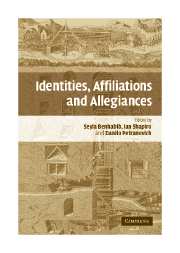Book contents
- Frontmatter
- Contents
- List of figures
- List of tables
- List of contributors
- Editors' introduction
- Part I Emergence and limits of national political identities
- Part II Multiple identities in practice: the European example
- Part III Decoupling citizenship from identity
- 8 Binding problems, boundary problems: the trouble with “democratic citizenship”
- 9 Immigrant political integration and ethnic civic communities in Amsterdam
- 10 Nonterritorial boundaries of citizenship
- 11 Against birthright privilege: redefining citizenship as property
- Part IV Identity and historical injustice
- References
- Index
8 - Binding problems, boundary problems: the trouble with “democratic citizenship”
Published online by Cambridge University Press: 05 June 2012
- Frontmatter
- Contents
- List of figures
- List of tables
- List of contributors
- Editors' introduction
- Part I Emergence and limits of national political identities
- Part II Multiple identities in practice: the European example
- Part III Decoupling citizenship from identity
- 8 Binding problems, boundary problems: the trouble with “democratic citizenship”
- 9 Immigrant political integration and ethnic civic communities in Amsterdam
- 10 Nonterritorial boundaries of citizenship
- 11 Against birthright privilege: redefining citizenship as property
- Part IV Identity and historical injustice
- References
- Index
Summary
Democratic citizenship: the phrase is so familiar, it seems unremarkable. Yet “democratic citizenship” invokes two analytically distinct sets of principles, which stand in tension with one another. The phrase invokes, on the one hand, the democratic principles of collective self-determination, political equality, and inclusiveness. The democrat's most basic claim is that all who are affected by a collective norm should have a hand in helping make it. “Democratic citizenship” invokes, on the other hand, civic ideals of public-regarding political engagement: active citizen participation motivated by a felt sense of affinity with one's compatriots. For the civic republican, it is not just “people,” but “we, the people” who form a more perfect union. Thus, while democratic principles urge the expansion of the demos, civic ideals impel the closure of the political “we.”
This tension between democratic principles and civic ideals – inherent in the very notion of “democratic citizenship” – becomes particularly acute in the face of globalizing pressures. That is to say, it poses critical problems for any democratic theory that takes as its subject matter an increasingly interdependent world, in which the set of those subject to a collective norm is rarely homologous with the set of those defined as its author. Hence the increased attention in recent years to the trouble this tension makes for democratic theory.
- Type
- Chapter
- Information
- Identities, Affiliations, and Allegiances , pp. 181 - 205Publisher: Cambridge University PressPrint publication year: 2007
- 4
- Cited by



